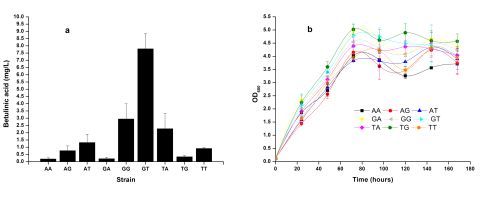Increase of BA Prodution Promises Antitumor and Anti-HIV Activity
2014-03-14
Betulinic acid (BA) is a plant-based triterpenoid that has been recognized for its antitumor and anti-HIV activities. Because of its specific cytotoxicity against tumor cells, BA was considered to be a future promising anticancer compound. Despite its great potential for clinical applications, the insufficient supply of BA in its natural hosts is a major obstacle in commercializing this compound.
Birch bark is the major plant source for extracting BA, but the level of BA in its natural hosts is extremely low. Every year, around 23,0000 tons of birch bark are used to extract the compound, which has resulted in a serious shortage of the botany source supply and limited its production in a large scale for the market.
Under the supervision of Prof. ZHANG Yansheng from Wuhan Botanical Garden, Ph.D student LI Jing constructed BA biosynthetic pathway in Saccharomyces cerevisiae by metabolic engineering. Given the BA forming pathways sharing the common substrate acetyl-CoA with fatty acid synthesis, the metabolic fluxes between the two pathways were varied by changing gene expressions, and their effects on BA production were investigated. The results demonstrated that it was possible to improve the BA production in S. cerevisiae while keeping a desirable growth phenotype by optimally balancing the carbon fluxes of the two pathways. The milligram of BA per liter was produced in the engineered yeast factory.
Relevant results were published in Applied Microbiology and Biotechnology online entitled “Increase of betulinic acid production inSaccharomyces cerevisiaeby balancing fatty acids and BA forming pathways”.

Effects of mutually varied expression of two modules (fatty acid and betulinic acid modules) on the production of BA (a) and yeast growth property (b) (Image by WBG)